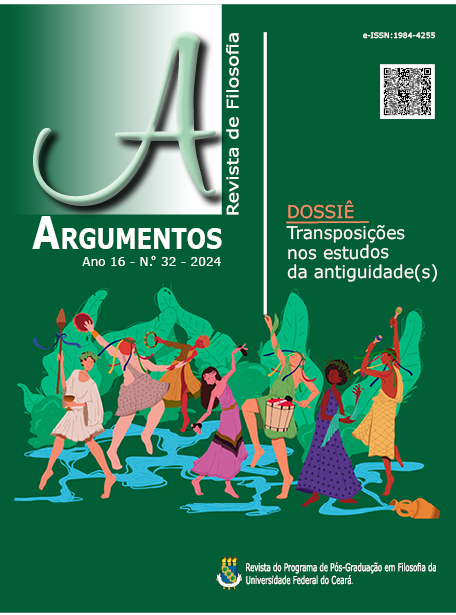What is public philosophy
Keywords:
Public philosophy. Explication. Philosophy of the sciences. Public intellectual.Abstract
In this article, I propose a new definition of public philosophy. In light of Carnap’s criteria for the explication of a concept, I argue that the proposed definition is more precise, similar enough to current uses of the expression, and more philosophically and socially fruitful than extant definitions. I then present what I take to be the three paradigmatic types of public philosophy as well as two hybrid cases. In short, I define public philosophy as philosophy addressed to an audience outside of philosophy in response to that audience’s interests or research goals.
References
ALEXANDROVA, A. Can the Science of Well-Being Be Objective? British Journal for the Philosophy of Science, v. 69, n. 2, 2018, p. 421–445.
BOTELHO, A.; SCHWARCZ, L. M. Esse enigma chamado Brasil: apresentação. In: BOTELHO, A.; SCHWARCZ, L. M. (Ed.). Um enigma chamado Brasil: 29 intérpretes e um país. São Paulo: Companhia das Letras, 2009. p. 7-10.
CARNAP, R. Logical foundations of probability. 2. ed. Chicago: The University of Chicago Press; Routledge & Kegan Paul, 1962.
CARNAP, R. Meaning and necessity: a study in semantics and modal logic. Chicago: The University of Chicago Press, 1947.
FEHR, C.; PLAISANCE, K. S. Socially relevant philosophy of science: an introduction. Synthese, v. 177, n. 3, 2010, p. 301–316.
GETTIER, E. L. Is Justified True Belief Knowledge? Analysis, v. 23, n. 6, jun./1963, p. 121-131.
LAPLANE, L. et. al. Why science needs philosophy. Proceedings of the National Academy of Sciences of the United States of America, v. 116, n. 10, 2016, p. 3948-3952.
MCINTYRE, L.; MCHUGH, N.; OLASOV, I. A companion to public philosophy. [S.l.] Wiley-Blackwell, 2022.
NAGEL, E. The structure of science: problems in the logic of scientific explanation. New York: Harcourt, Brace & World, 1961.
SANDEL, M. J. Public philosophy: essays on morality in politics. Cambridge; London: Harvard University Press, 2005.
SELLARS, W. Science, perception and reality. Atascadero: Ridgeview Publishing Company, 1991.
STRAWSON, P. F. Carnap’s views on constructed systems versus natural languages in analytic philosophy. In: SCHILPP, P. A. (Ed.). The philosophy of Rudolf Carnap. La Salle: Open Court, 1963. p. 503-518.
TULLY, J. Public philosophy in a new key. Volume 1: Democracy and civic freedom. Cambridge: Cambridge University Press, 2009.
WALZER, M. The political theory license. Annual Review of Political Science, v. 16, n. 1, 2013, p. 1–9.
WOLFF, F. Dilema dos Intelectuais. Disponível em: https://artepensamento.com.br/item/dilema-dos-intelectuais/.
Downloads
Published
Issue
Section
License
Argumentos magazine is licensed under an International Creative Commons Attribution License.
The Magazine uses CC BY inclusion
1) The authors retain the copyright granted to the magazine or the right to initial publication, with the work regularly licensed under the Creative Commons Attribution, which allows the sharing of the work with acknowledgment of authorship and initial publication in this magazine.
2) The authors are authorized to contract additional applicable contracts, for non-exclusive distribution of the version of the work published in this journal (for example, publication in the institutional repository or as a chapter of the book), recognition of authorship and initial publication in this journal.
3) Authors are authorized and encourage to publish and distribute their work online (for example, in institutional repositories or on their personal pages) at any time before or during the editorial process, as they can generate productive changes, as well as increase the impact and reference of published work.




.jpg)










._._3.png)
1.jpg)
._._._.png)
